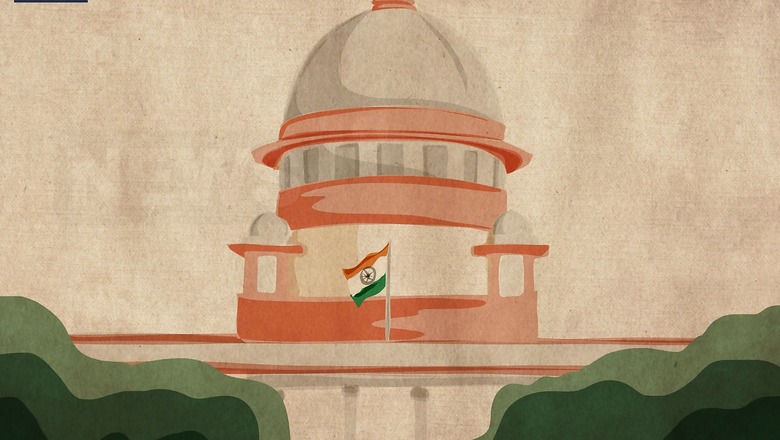
views
New Delhi: The right to resignation by a lawmaker is a "democratic right" and it is high time that the judiciary lay down guidelines for speakers, the Karnataka assembly speaker's office told the Supreme Court on Wednesday.
Solicitor General Tushar Mehta, representing the office of the Karnataka assembly speaker, told a three-judge bench headed by Justice N V Ramana that an MLA can be disqualified for giving up membership of a political party but he or she cannot be disqualified for giving up membership of the House.
Mehta argued this when the bench, also comprising justices Sanjiv Khanna and Krishna Murari, was hearing a batch of pleas filed by 17 disqualified Karnataka MLAs, who have challenged the decision of former Speaker K R Ramesh Kumar to disqualify them.
"Probably, this may happen frequently and travel beyond these 17 persons. Right to resign is a right recognised by this court in a Constitution bench verdict," the solicitor general told the bench, adding that tendering resignation is a "democratic right because the person wants to go back to the electorate".
"I cannot be critical of what has happened in the past in this case but it may happen very frequently and the issue needs to be adjudicated. It's high time that the judiciary lay down guidelines for the speaker," Mehta said.
However, the bench said the courts cannot lay down guidelines for speakers.
"How can we lay down guidelines for the speaker? He is a constitutional authority," the bench said, adding, "we cannot encroach in his domain."
Referring to a Constitution bench verdict of the apex court, Mehta said if an MLA does not agree with the views of his party and resigns from the membership of the house, he can go back to the electorate to seek a fresh mandate.
"This is the recognition of the right to resign," he said and added that "loyalty to the party is one thing but you (an MLA) cannot be blind-folded by the party's whip".
He said three days notice given by the then Karnataka speaker to these 17 petitioners to respond to the disqualification motion was "factually incorrect".
Changing political parties as an MLA is defection but first resigning from the membership of the house and then shifting to another party cannot be termed as defection, Mehta said.
He said if an MLA tenders his resignation, the only thing which the speaker has to see is whether it is voluntary or not.
Senior advocate Mukul Rohatgi, appearing for some of the disqualified MLAs, assailed the decision of the then speaker and said there is no rule that the disqualification has to be decided first and resignation kept pending.
The upcoming bypolls to 15 assembly constituencies in Karnataka should be stayed or deferred till the top court decides this issue and alternatively, the disqualification order should also be stayed, he said.
"We (disqualified MLAs) do not want to go to the electorate with this taint of disqualification," the advocate said, adding that these petitioners should be allowed to contest the bypolls.
Rohatgi, while contending that the then speaker had behaved like a "headmaster", also said the rejection of their resignation by him was "completely wrong".
Senior advocate C A Sundaram, appearing for one of the disqualified MLAs, told the top court that it is "not a sin to leave a party" as basis of democracy is "dissent".
"My (petitioner's) resignation was as a member of the house, not as a member of the party," he said, adding that disobeying a whip cannot be treated as leaving the party.
Sundaram said an MLA can always leave his party and go back to the electorate to face elections.
"Sin is joining another political party when I am an MLA of another party," he said, adding, "the speaker is the master of the house, not the president of a party".
Senior advocate V Giri, appearing for two disqualified MLAs, also questioned the then speaker's decision and said one of his clients had not resigned but still he was disqualified.
The then speaker's order based on alleged defiance of party whip was "in violation of the Supreme Court order" which said these MLAs cannot be compelled to attend assembly proceedings during the trust vote, Senior advocate K V Vishwanathan, representing one of the petitioners, said.
Senior lawyer Sajjan Poovaiah, appearing for one of the disqualified MLAs, said his client had resigned while protesting the then state government's decision to give 3,500 acre of land in his constituency to a private company.
The arguments in the matter remained inconclusive and would continue on Thursday.
The Election Commission had on September 23 told the top court that the former speaker's order disqualifying these 17 MLAs cannot deprive them of their right to contest by-polls.
The poll panel had said bypolls should not be stayed.
The then speaker disqualified these MLAs and it eventually led to fall of the Congress-JD(S) government headed by the then chief minister HD Kumaraswamy.
Kumaraswamy resigned as chief minister after losing a trust vote, which paved the way for the BJP-led government in the state under B S Yediyurappa.
The disqualified lawmakers have approached the apex court, challenging former Speaker Ramesh Kumar's decision to disqualify them.
Some of them have contended in their pleas that the decision taken by him before resigning as speaker was an illegal, arbitrary and mala fide exercise of his power under the 10th Schedule of the Constitution.
They also questioned Kumar's decision to reject their resignations by holding that those weren't voluntary and genuine.




















Comments
0 comment